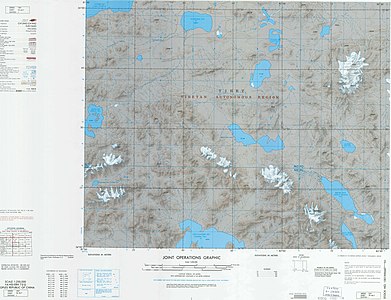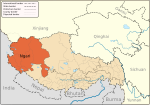Guozha Lake
| Guozha Lake | |
|---|---|
| Kotra Tso | |
 Guozha Lake viewed from space | |
| Location | Rutog County, Tibet, China |
| Coordinates | 35°1′53″N 81°5′11″E / 35.03139°N 81.08639°E |
| Basin countries | China |
| Max. length | 30.4 km (19 mi) |
| Max. width | 11.6 km (7 mi) |
| Surface area | 252.6 km2 (100 sq mi) |
| Max. depth | 81.9 m (269 ft) |
| Shore length1 | 104 km (65 mi) |
| Surface elevation | 5,080 m (16,667 ft) |
| 1 Shore length is not a well-defined measure. | |
Kotra Tso (Tibetan: ཀོ་བཀྲ་མཚ, Wylie: ko bkra mtsha, THL: ko tra tsa),[1] or Guozha Lake (Chinese: 郭扎错; pinyin: Guō zhā cuò),[a] previously called Lake Lighten,[2][b] is a glacial lake in Rutog County in the Ngari Prefecture in the northwest of the Tibet Autonomous Region of China. It lies in the western Kunlun Mountains to the northwest of Bangda Lake,[4] not far from the regional border with Xinjiang.[5] Located at an altitude of 5080 metres, it covers an area of 244 square kilometres with a maximum depth of 81.9 metres and has a drainage basin containing 62 glaciers.[6]
India's claim line in Aksai Chin runs along the water-parting line of Lake Lighten and the Amtogor Lake to the west.[3] However, China has claimed the whole of Aksai Chin in 1959.
Maps
-
Map including LI-T'IEN HU (Lake Lighten)) (DMA, 1973)
Notes
References
- ^ Lake Kotra, kmaps.virginia.edu, retrieved 2021-07-03.
- ^ Michael Ward. The Kun Lun Shan: Desert Peaks of Central Asia, The Alpine Journal (1989-90), p. 90.
- ^ a b Lamb, Alastair (1973), The Sino-Indian Border in Ladakh (PDF), Australian National University Press, p. 10
- ^ Ehlers, Jürgen; Gibbard, Philip Leonard (15 July 2004). Quaternary Glaciations: South America, Asia, Africa, Australasia, Antarctica. Elsevier. p. 107. ISBN 978-0-444-51593-3. Retrieved 9 April 2012.
- ^ Maps (Map). Google Maps.
- ^ Chaohai, Liu; Shijie, Li; Yafeng, Shi (2017). "Glacial and lake fluctuations in the area of the west Kunlun mountains during the last 45 000 years" (PDF). Annals of Glaciology. 16. Table 1. Bibcode:1992AnGla..16...79C. doi:10.3189/1992AoG16-1-79-84. ISSN 0260-3055.


![Map including Lake Lighten and surrounding region (AMS, 1950)[c]](/upwiki/wikipedia/commons/thumb/3/34/Txu-oclc-6654394-ni-44-3rd-ed.jpg/320px-Txu-oclc-6654394-ni-44-3rd-ed.jpg)

